#solarpunk press
Text
writeblr intro
I need to make a new pinned post anyway, so it seems like a good time to introduce myself!
I'm Ellis Nye, and I'm a sci-fi and fantasy writer, with occasional elements of historical fiction, horror, and romance. Right now, I'm focusing on short stories.
Two of my short stories have been published:
Shelf-stable: "In a transitional post-post-apocalypse, Ada dreads the arrival of the witch who regularly visits her town." You can buy the issue of Solarpunk Magazine (@solarpunkmagazine on here) that it appears in here. You can see my posts about this short story here.
The Last Great Repair Tech of the American Midwest: "A story about love and community in the midst of an apocalypse of planned obsolescence, framed as an obituary." You can go to this page to find links to buy the eBook, plus the story will go up for free on the Reckoning website in July of 2024. You can see my posts about this short story here.
(For whatever reason, my published short stories lean more towards the lighthearted/uplifting end of what I write. This is going to make the eventual publication of some of my other stuff really funny.)
I write:
Retellings--mythology, fairy tales, folklore, ballads, classic lit, and more
Small, quiet stories happening in the middle of the action
Dialogue-heavy stories
"Found fiction" (Archive of the Odd introduced me to this term and I love it!)
Disabled characters
Queer characters
Stuff that I hope makes you go "wait that was kind of fucked up" half an hour after reading it
Stuff that makes me cry
Stories that did, actually, come to me in a dream
Gross stuff
I'm very into worldbuilding, but my current focus on short stories tends to limit me there somewhat. I do plan to go back to writing novels, with an eventual focus on getting published, but that's not in the cards right now.
I have a tag for each story I post about, so for example "story: deadname" for posts about my WIP "Deadname" or "story: in perfect light" for a finished-ish story I've started submitting places.
I also have a Twitter account with this same username, but I don't use it as much as I use this account.
#writeblr intro#writeblr introduction#solarpunk#short story writing#original fiction#science fiction#environmental fiction#solarpunk press#reckoning magazine#op#story: shelf stable#story: the last repair tech
64 notes
·
View notes
Text
Solarpunk AMA on r/Fantasy at 12 PM EST Today, 3/30/23
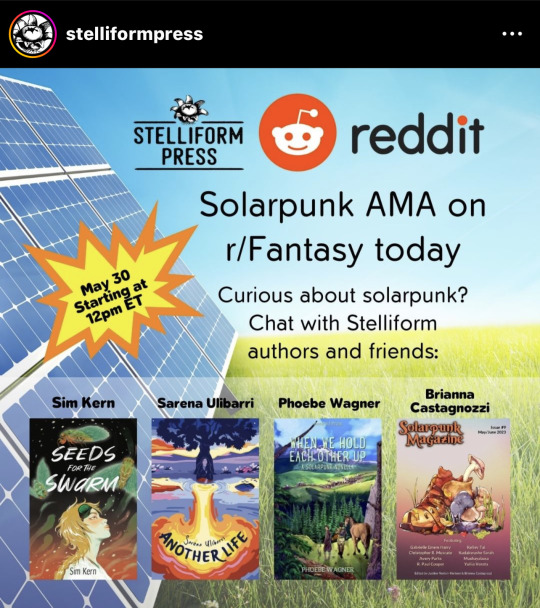
Join Sim Kern (Seeds for the Swarm), Sarena Ulibarri (Another Life), Phoebe Wagner (When We Hold Each Other Up), and Brianna Castagnozzi (co-EIC of Solarpunk Magazine) for an AMA hosted by Stelliform Press on r/Fantasy!
Come ask us questions about the solarpunk movement and sci-do subgenre.
55 notes
·
View notes
Text
youtube
The cyberpunk aesthetic tells us right off the bat that whatever we’ve sat down to read/watch/play is set in ~the future~. Right?
In this episode, Ariel and Christina discuss cyberpunk’s origins not just as an intentional intervention into the science fiction genre imagination, but how it currently is used as a shorthand for a certain type of future - and whether it can really be said to be a future at all.
#solarpunk#Solarpunk Presents Podcast#podcast#podcasting#solarpunk podcast#cyberpunk#solarpunk and cyberpunk#cyberpunk aesthetic#future aesthetic#futuristic aesthetic#cyberpunk technology#cyberpunk literature#solarpunk questions#solarpunk narrative in a cyberpunk setting#the cloud#cyberpunk as a fantasy setting#show don’t tell#cyberpunk media#The Matrix#Neuromancer#Johnny Mnemonic#John Varley#Press Enter#cyberpunk critique of capitalism#Youtube
9 notes
·
View notes
Text
"Solarpunk Creatures" by N R M Roshak and Tashan Mehta
An inspiring and comforting collection to treasure.
#books #bookreview #reading #readerviews
Solarpunk Creatures
N R M Roshak, Tashan Mehta, and Editor Christoph RupprechtWorld Weaver Press (2024)ISBN: 978-1734054576Reviewed by Leslie Anne Smith for Reader Views (03/2024)
“Solarpunk Creatures” is a new anthology from World Weaver Press, joining their line of solarpunk reimaging anthologies. “Solarpunk Creatures” stars a collective of non-human and human adjacent protagonists, with some…
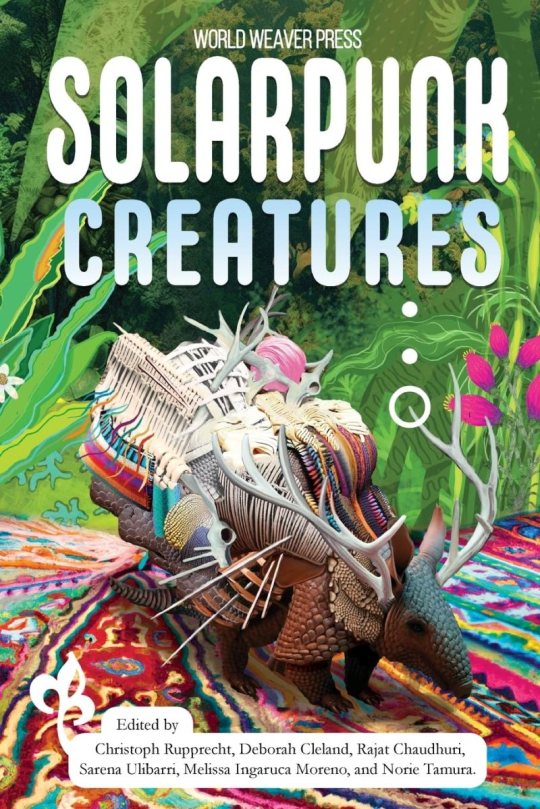
View On WordPress
#Book Review#Christoph Rupprecht- Editor#N R M Roshak#Reader Views#Solarpunk Creatures#Tashan Mehta#World Weaver Press
3 notes
·
View notes
Text
[publishing] Transform the World
It’s here!
Everything you need to know is here.
You can buy it here.
Why wait?

View On WordPress
1 note
·
View note
Text
solarpunk club/community group?? fun. im planning on starting one at my school so i thought i would share some ideas :]
Club Activities
learning to mend
make patches
zine creation
graffiti stencils (careful.)
stamps! flower pressing! book binding! paper making! screenprinting! really just a ton of craft shit
repurposing household items
LEARNING! (importance of community, native vs invasive plants, walkable and green cities, sustainable fashion, capitalism/rapid consumerism, grass lawns, book talk, solar energy, current climate efforts, local small businesses, public transportation, sustainable living…)
Potential Events
no-buy market
student/local artists craft fair
collab with library
host nature walks
walk around our city to see areas of improvement
community garden/fridge/cabinet project
solar energy speaker / local environmental groups
if any of yall have other ideas i would love to hear them!!
#started brainstorming at like 2am yesterday bc barista forgot to give me decaf 😭#solarpunk#solar punk#ecopunk#eco punk#community#sustainability#environmentalism#theres already an eco club at my school so i gotta do something different
604 notes
·
View notes
Text
random facts for my Dead On Main childhood friends au:
Danny's ghost form changed when he was with Jason in the ghost zone, and then reverted back to how it was after he died when Jason disappeared.
Danny as a human has blue-green eyes. As in, his eyes are blue with the lower half being green, and they bleed into one another at the middle. This is entirely because of Danny being a halfa, its meant to represent how he's no longer completely human.
In contrast, Jason's eyes are teal with hints of green. This is because he was revived. One half crawled out of the grave, and the other never left.
If you stare at Danny's eyes for too long, it sometimes looks like the green and blue are swirling together but never mixing, like water and oil. People agree that its very beautiful, but very unsettling.
Danny's lichtenberg figures as a ghost are black, and when he cries his tears float and disappear when they fall off his face. The tears have a thick, almost gel-like substance to them if you touch it.
Danny's ghost form is pretty unsettling - he fully embraced the fact that he died and in turn strongly shows it through his ghost form, plus the additional effect his grief has on his form. He's not who you would think of when you're told "we have a ghost hero protecting the city". he looks like someone the hero would fight. Danny usually keeps his goggles on over his face for this reason.
The black space on his suit, naturally, has stars on them. they shift and move as he does, and sometimes there are nebulae that swirl into view.
His lair in the ghost zone is an observatory, but like one of those fantasy looking ones that you'd see in some kind of solarpunk ghibli movie. it's huge on the inside, with a long hallway with polaroids strung along the walls, and doors leading into different rooms. The main room is the 'observe floor' with a large domed ceiling and furniture littered around near the walls, and more polaroids. Danny can press a button on the side wall to 'open' the dome ceiling and reveal a night sky above his head that he can float up into. some of these stars are danny's memories that play when you touch them. danny can move the night sky around like an interactive screen, and find new stars. This observatory has a hammock.
Danny's got his 'Kill The Clown' corkboard in his lair as well, it mirrors out into his apartment.
Oh. The hole in his heart. You can stick your hand into it. Or try to. Danny's gonna shove you back immediately though, because it feels weird. And also it's gonna leave a Substance on your hand that's gonna be really hard to take off, stains afterward, and has the consistency of semi-thick ink and oil. His tears are made of the same stuff.
Danny's Ghost Forms below (without his mad scientist goggles bc i forgot to add. them) Left is after he reunites with Jason (both times), and the Right is pre-reunion (both times).

#dpxdc#dp x dc#dp x dc crossover#danny fenton is not the ghost king#dpdc#childhood friends au#cfau#making danny's ghost form scary >>>>#i thought about just. describing danny's ghost form but i felt too cheesy so i figured i'd just draw it instead. made a paragraph#and then grabbed my notebook instead#left be like: emo rock band right be like: horror movie monster#they both have claws tho.#tumblr nerfed the quality but danny's eyes on the left have blue in the center that fades outwards which i thought was neat#danny's scars on the left being green and thus harder to see on his skin is an on purpose decision#the earring danny is wearing on the left is supposed to be star shaped. the matching earring is half its length and is being worn by jason.#dead on main
138 notes
·
View notes
Text
Hey check this out
I was making a zine (solarpunk ofc) and decided to use a bunch of old National Geographic magazines to cut up and use in a scrappy diy scrapbook fashion and of course I started reading them. This one in particular:
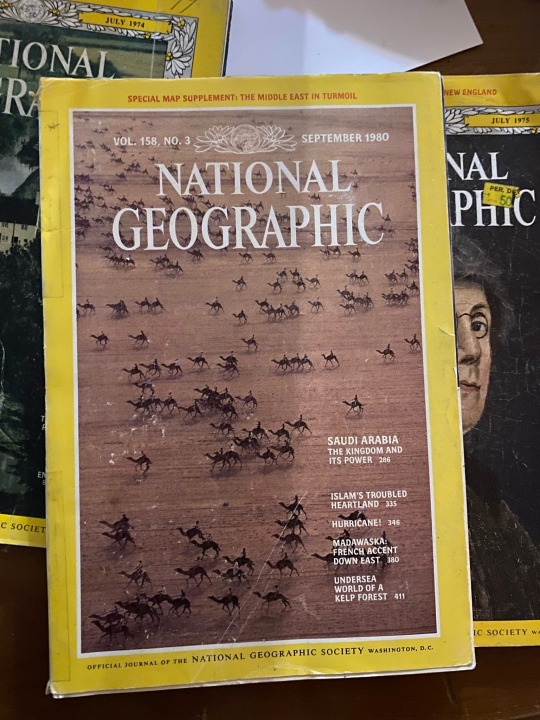
It caught my eye because it’s from September 1980 & talks about the Middle East. My brain wonders if they mention Palestine and they do! I copied the text for accessibility, but I put pictures at the end of the original pages.
“Jerusalem: reunited or occupied? The question has divided the city's 400,000 Jews and 100,000 Arabs since Israel annexed East Jerusalem in 1967.
BEIRUT, JANUARY 1975. Armed soldiers lead me through labyrinthine back streets, up a dark stairway to a midnight rendez-vous. Only a bare bulb lights the temporary command post; Yasir Arafat, chairman of the Palestine Liberation Organization, seldom dares spend two days in the same place. “Our argument is not with the Jews” He tells me. "We are both Semites. They have lived with us for centuries. Our enemies are the Zionist colonizers and their backers who insist Palestine belongs to them exclusively.
We Arabs claim deep roots there too."
Two decades ago Palestinians were to be found in United Nations Relief Agency camps at places like Gaza and Jericho, in a forlorn and pitiable state. While Palestinian spokesmen pressed their case in world cap-itals, the loudest voice the world heard was that of terrorists, with whom the word Palestinian came to be associated. Jordan fought a war to curb them. The disintegration of Lebanon was due in part to the thousands of refugees within its borders.
Prospects for peace brightened, however, when President Anwar Sadat of Egypt, most powerful of the Arab countries, made his historic trip to Israel in November 1977. A year later Sadat and Israeli Prime Minister Menachem Begin signed the Camp David accords, a framework for the return of the occupied Sinai Peninsula to Egypt.
The former enemies established diplomatic relations and opened mail, telephone, and airline communications.
The Camp David accords also addressed the all-important Palestinian question but left it vague. Sadat insists that any lasting peace depends on an eventual Palestinian homeland in the Israeli-occupied West Bank and Gaza. Israel agrees to limited autonomy for those regions, but, fearful of a new and hostile Palestinian state suddenly planted on its borders, insists that Israeli troops must maintain security there.
Crowded Rashidiyah refugee camp, set among orange groves south of the ancient Phoenician port of Tyre in Lebanon, lies on the front lines. Frequent pounding by Israeli military jets and warships seeking PLO targets has war-hardened its population, some 13,700 Palestinians.
At the schoolyard I watched a solemn flag raising. Uniformed ashbal, or lion cubs, stood rigid as color guards briskly ran up the green-white-and-black Palestinian flag.
Ranging in age from 8 to 12, they might have been Cub Scouts— except for the loaded rifles they held at present arms. Behind them stood two rows of girls, zaharat, or little flowers. Same age, same weapons.
Over lunch of flat bread, hummus, yo-gurt, and chicken I commented to my hosts, a group of combat-ready fedayeen, that 30 years of bitter war had settled nothing nor gained the Palestinians one inch of their homeland. Was there no peaceful way to press their cause?
"Yes, and we are doing it. Finally, after 30 years, most countries in the United Nations recognize that we too have rights in Palestine. But we feel that until your country stops its unconditional aid to Israel, we have two choices: to fight, or to face an unmarked grave in exile."
AFTER CROSSING the Allenby Bridge from Amman, I drove across the fertile Jordan Valley through Arab Jericho and past some of the controversial new Jewish settlements: Mitzpe Jericho, Tomer, Maale Adumim, Shilat. Then as I climbed through the steep stony hills to Jerusalem, I saw that it too had changed. A ring of high-rise apartments and offices was growing inexorably around the occupied Arab side of the walled town. Within the wall, too, scores of Arab houses had been leveled during extensive reconstruction.
"Already 64 settlements have been built on the West Bank," said a Christian Palestinian agriculturist working for an American church group in Jerusalem. "And another 10 are planned," he said. Unfolding a copy of the master plan prepared in 1978 by the World Zionist Organization, he read: "Real-izing our right to Eretz-Israel... with or without peace, we will have to learn to live with the minorities...
The Israeli Government has reaffirmed the policy. In Prime Minister Menachem Begin's words: "Settlement is an inherent and inalienable right. It is an integral part of our national security."
"Security" is a word deeply etched into the Israeli psyche. The country has lived for 30 years as an armed camp, always on guard against PLO raids and terrorist bombings.
Whenever such incidents occur, the response is quick: even greater retaliation.
In Jerusalem I met with David Eppel, an English-language broadcaster for the Voice of Israel. "We must continue to build this country. Israel is our lawful home, our des-tiny. We have the determination, and an immense pool of talent, to see it through." His cosmopolitan friends a city plan-ner, a psychology professor, an author gathered for coffee and conversation at David's modern apartment on Jerusalem's Leib Yaffe Road.
Amia Lieblich's book, Tin Soldiers on Jerusalem Beach, studies the debilitating effects almost constant war has had on life in the Jewish state, a nation still surrounded by enemies. As she and her husband kindly drove me to my hotel in Arab Jerusalem afterward, some of that national apprehension surfaced in the writer herself.
"We don't often come over to this part of town," she said. "Especially at night."
I DROVE OUT of the Old City in the dark of morning and arrived a few hours later at the nearly finished Israeli frontier post, whence a shuttle bus bounced me through no-man's-land to the Egyptian ter-minal. As a result of the Egyptian-Israeli treaty, it was possible for the first time since 1948 to travel overland from Jerusalem to Cairo. An Egyptian customs man opened my bags on a card table set up in the sand. I took a battered taxi into nearby El Arish, to a sleepy bank that took 45 minutes to convert dollars into Egyptian pounds, Then 1 hired a Mercedes for the
200-mile run across the northern Sinai des-ert, the Suez Canal, and the Nile Delta. By sundown Cairo was mine.
Despite official government optimism, I found many in Cairo worried that President Sadat's bold diplomatic gestures might fail.
The city was noticeably tense as Israel officially opened its new embassy on Mohi el-Din Abu el-Ez Street in Cairo's Dukki quarter. Black-uniformed Egyptian troops guarded the chancery and nearby intersections as the Star of David flew for the first time in an Arab capital. Across town, police with fixed bayonets were posted every ten feet around the American Embassy. Others were posted at the TV station and the larger hotels. Protests were scattered, mostly peaceful. None disturbed the cadence of the city.
Welcoming ever larger delegations of tourists and businessmen from Europe and the U.S., Cairo was busier than ever-and more crowded. Despite a building boom, many Egyptians migrating from the countryside, perhaps 10,000 a month, still find housing only by squatting among tombs at the City of the Dead, the huge old cemetery on the southeast side of the capital.
Even with the new elevated highway and wider bridge across the Nile, half-hour traffic standstills are common. Commuters arrive at Ramses Station riding even the roofs of trains, then cram buses until axles break.
Cairo smog, a corrosive blend of diesel fumes and hot dust from surrounding des-erts, rivals tear gas.
Despite the rampant blessings of prog-ress, Cairo can still charm. In the medieval Khan el-Khalili bazaar near Cairo's thousand-year-old Al-Azhar University, I sought out Ahmad Saadullah's sidewalk café. I found that 30 piasters (45 cents) still brings hot tea, a tall water pipe primed with tobacco and glowing charcoal, and the latest gossip. The turbaned gentleman on the carpeted bench opposite was unusually talk-ative; we dispensed with weather and the high cost of living and got right to politics:
"Of course I am behind President Sadat, but he is taking a great risk. The Israelis have not fully responded. If Sadat fails, no other Arab leader will dare try for peace again for a generation."
Across town at the weekly Akhbar El-Yom newspaper, one of the largest and most widely read in the Middle East, chief editor Abdel-Hamid Abdel-Ghani drove home that same point.
"What worries me most is that President Sadat's agreement with Israel has isolated Egypt from our brother nations," he told me. "When Saudi Arabia broke with us, it was a heavy loss. The Saudis are our close neighbors. Now they have canceled pledges for hundreds of millions in development aid to Egypt. Some 200,000 Egyptians-teach-ers, doctors, engineers live and work in the kingdom.
"And Saudi Arabia, guardian of the holy cities of Mecca and Medina, remains for Muslim Egypt a spiritual homeland."
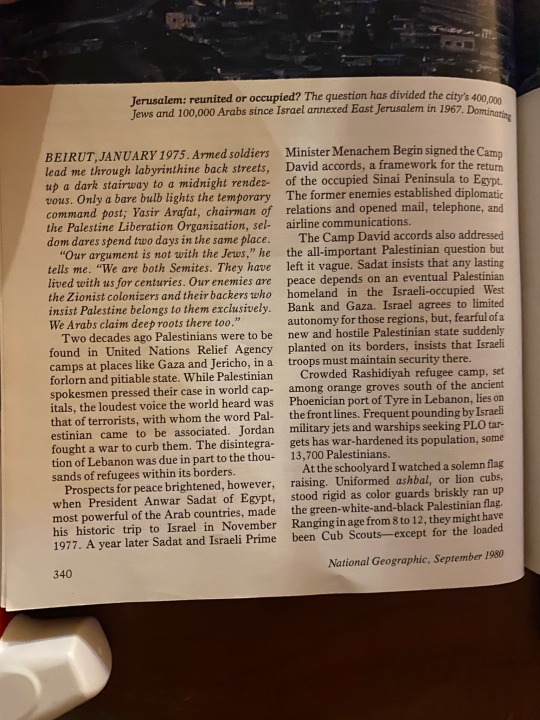
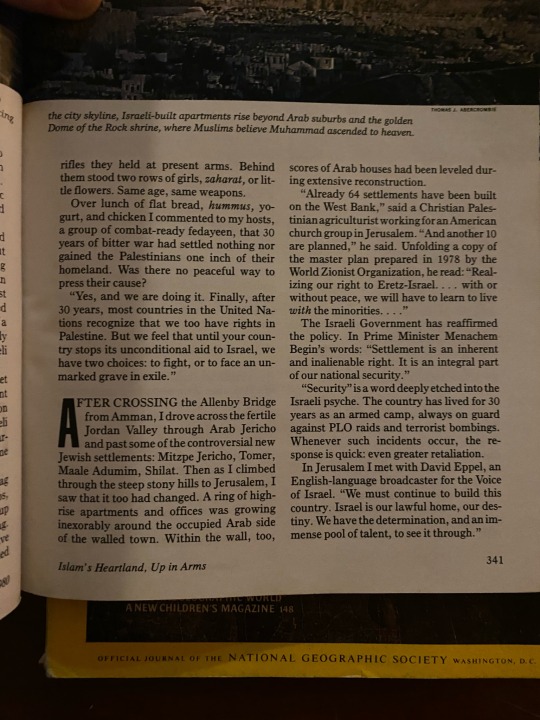
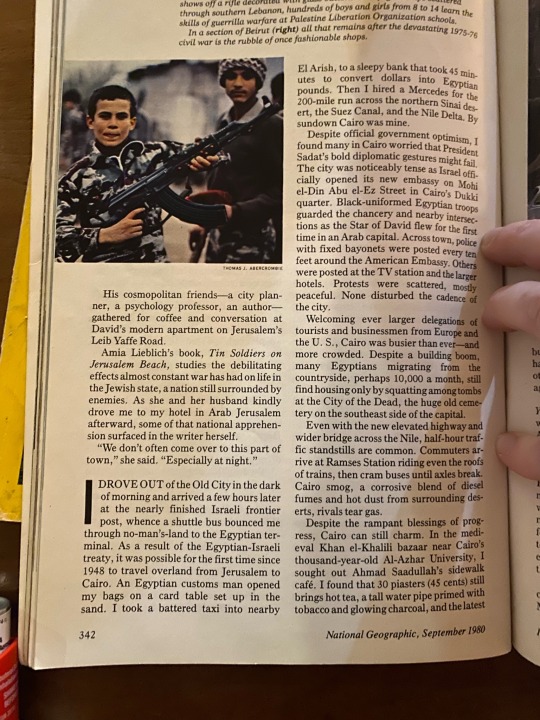
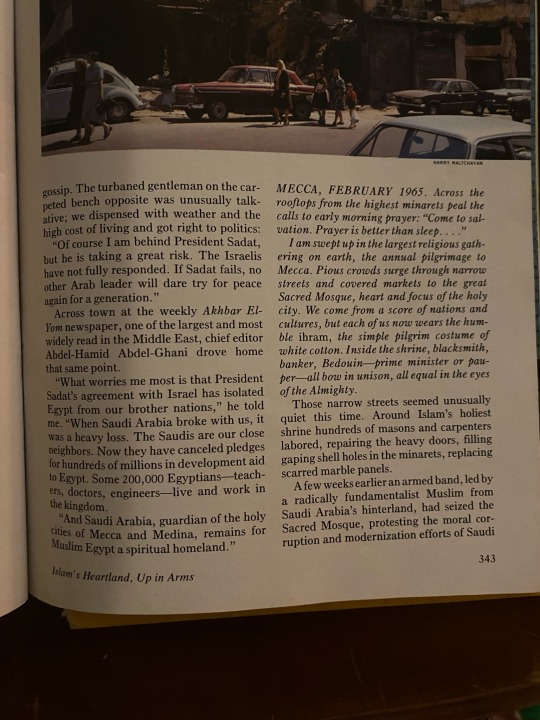
This magazine was published before my mom was born, and yet the sentiments have basically unchanged. An interesting look at the past, and more proof this didn’t start October 7th. (But imagine my followers already knew that)
#Palestine#free palestine#from the river to the sea palestine will be free#national geographic#September 1980
52 notes
·
View notes
Text
Accessibility for Neurodivergence and Mental Health
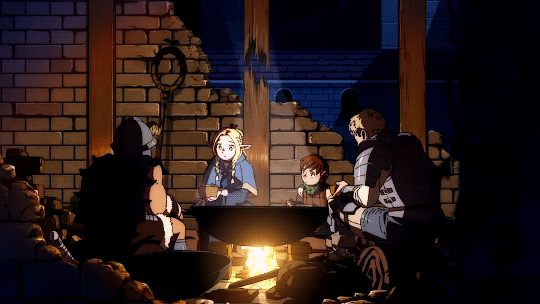
Okay, let's talk a bit more about accessibility in worldbuilding - especially in terms of making a world more accessible to neurodivergent people and folks who struggle with their mental health.
Now, let me start with one thing: While we obviously do not know a lot of how neurodivergent people lived in historical times - especially given that the concept was not around back then - but it is generally believed that especially for people with ADHD and a variety of forms of Autism live was actually a lot better, because a lot of out issues are closely linked with the fact that our brains do not do "9 to 5 work in an office". This is not true for all of us, but for quite a few. There is also some autistic people were seen a valuable for some of their unique traits.
It should at this point also be noted that in general it is also believed that in medieval societies people did work less than they do these days. (Around 30 hours a week.) Which also will be a lot more bearable for a lot of people with both neurodivergent brains and generally mental health struggles. Especially as outdoor work will also be considered easier for a lot of folks. Hence there is a chance that in a medieval setting for example folks might need a bit less in terms of accessibility, as their needs are generally already met.
That said, accessibility for a lot of neurodivergent people means first and foremost to create spaces for retreat. Meaning: Some sort of space or room, where folks can unwire. Soft, and dimmed light, maybe some good place to sit down, silence or alternative very soft noises. To allow for those places in public spaces and work places is just important for neurodivergent folks.
Of course, this is a bit less pressing in a setting where people are already in nature all the time. But especially science fiction settings this can be a big need.
Also important for a science fiction setting especially: Spaces that allow neurodivergent people to control their environment to some degree. Which means especially in terms of noise and lighting.
A general accessibility need that would also help pretty much everyone, is less working hours for everyone. As I said: Generally it is believed that in medieval times folks did not work more than 30 hours a week on average, so anything else would be unrealistic (outside of the sowing and harvest times). And if we are talking about a science fiction future, it should be assumed that a lot of processes can be automated. This goes specifically if we are talking something like a Solarpunk future, where we are going to assume that capitalism has ended, so stuff being automated is actually a good thing, because people do not need to work for a living.
Something that a lot of people also do overlook in terms of mental health needs, is green spaces. Our stupid monkey brains crave seeing nature and being surrounded by nature. It does improve our mental health. (Which also is, why in Cyberpunk we definitely should talk abotu the ongoing mental health crisis, that most cyberpunk stories do not really mention...)
And of course just some general accessibility needed would be... more and easier access to information about all the different t hings. I mean, a lot of the issues that both neurodivergent folks and folks with mental health issues have to deal with are prejudices. And those prejudices originate with the fact that folks in general are just not very well educated on those topics. In fact there is a general bias against all those things, partly stemming from prejudice, partly from people just never having learned how to deal with people that are not neurotypical.
Not to mention that more education on this would also help people in question to learn that they are not really weird, but just not neurotypical.
Once again, if you have anything to add, feel free!
#disability#disability rights#accessibility#neurodivergent#neurodiversity#mental health#autism#adhd#audhd#scifi#science fiction#clifi#fantasy#historical setting#solarpunk#lunarpunk
33 notes
·
View notes
Text
June 2023 Releases: 6 All-New Titles from Duck Prints Press Just in Time for Pride Month!
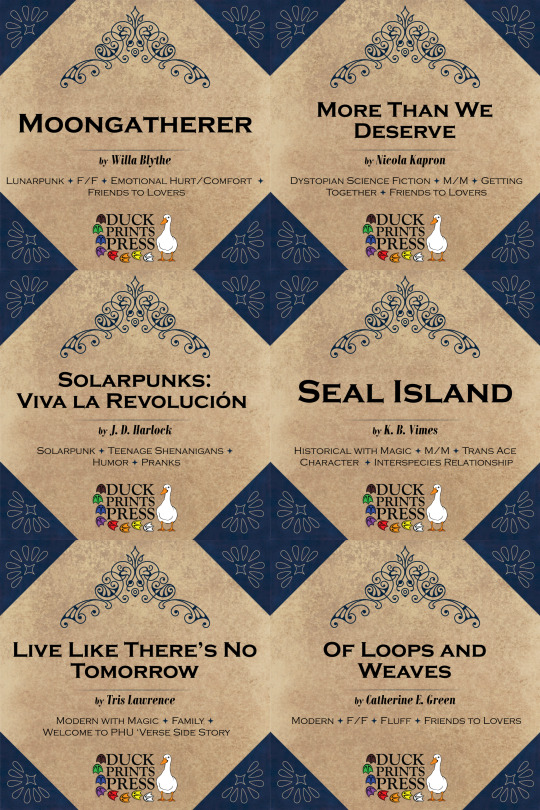
Happy Release Day, Everyone! We publish new short stories and novelettes for our General Imprint on the fourth Thursday of the month, and here we are with five new short stories and a novelette!
-
June 22nd Releases:
Title: Of Loops and Weaves
Author: Catherine E. Green
F/F, Getting Together, Maximum Fluff
Robin loves to sit in the local coffee shop, crocheting a sweater for her friend Dee, who she hopes will become more than a friend.
She doesn’t expect to need to frog a chunk of project.
And she really doesn’t expect Dee to walk in on her doing so…
-
Title: Solarpunks: Viva la Revolución (a story in the Solarpunks ‘verse)
Author: J. D. Harlock
Found Family, Utopian Future, the Very Teenage Urge to Rebel Against Authority
The future is perfect, with strong community ties, collective ownership, plenty for all, and an ideal balance of private life and public life.
In such a setting, what’s a group of bored teenagers to do to shake up the order of things?
Sami, Ros, and Amara aren’t sure…but Sami has a plan.
-
Title: Seal Island
Author: K. B. Vimes
M/M, Queerplatonic Relationship, Ace Trans Main Character, Selkies
Michael has always known he was a boy, and always known he didn’t fit in with either the boys or girls around him in the quiet fishing community where he grows up. To escape the insistence of his friends and family that he become a “proper young lady,” he seeks refuge on the island in the bay where the seals sun themselves during the summer.
It’s not until he’s 18 that he realizes he might be able to make the island a more permanent home. Will the seals welcome the young man who’s never felt like he’s belonged?
-
Title: More Than We Deserve
Author: Nicola Kapron
M/M, Finding a Slice of Hope Amidst Dystopia, Trans Main Character, Spies and Super Soldiers
Every year, the employees of The Winterborne Group have to fill out Form 301-A, checking off boxes related to gender and sexuality to enhance the megacorp’s diversity numbers.
This year, Dice uses this opportunity to finally, after years of passing, tell the company he’s trans.
That’s not the problem.
The problem is that Grey, Dice’s favorite company-owned Horizon super soldier, has asked for Dice’s help completing his Form 301-A.
-
Title: Live Like There’s No Tomorrow (a short prequel story in the Welcome to PHU ‘verse)
Author: Tris Lawrence
Family Feels, Surviving Cancer, Finding Hope Through Everyday Struggles
Middle-school student Jackson is not particularly upset about his cancer; the doctor’s assure him he’ll recover, and his biggest concern is that his friends will be a grade or more above him by the time he’s able to get back to school.
Well, that and that he’s sure that his mother is keeping a secret from him, but he can’t figure out what that secret is and she’s not talking about it.
-
Title: Moongatherer
Author: Willa Blythe
F/F, PTSD, Recovery From Trauma, Bonding While on a Quest Together
The Summer Solstice is approaching, the day when the sunlight lasts the longest and the dangers of being out in the world, exposed to the harsh rays, is greatest. As is their way, Clan Firefox has once again chosen two representatives to travel to Moon’s Rest and make an offering to the Goddess to bring the moonlight back.
No one is surprised that Pomegranate will be making the journey.
But everyone is shocked when Honeycomb is selected, and no one more so than Honeycomb herself.
And, as they set out on their journey, all Honeycomb can see is the memory of harsh solar rays and burning fires…
Maybe during this journey, these two young women can find more than they ever thought to seek…
-
Think they all sound amazing? Well, you should, because they are. And we’ve got you covered – you can buy ALL SIX of these new titles in one awesome bundle – and save 20% off the list price for buying each story individually!
Come on over to the Duck Prints Press webstore and find your new favorite short story! And, while you’re at it, don’t forget to check out the anthology we’re Kickstarting!
Want more stories, and to support our awesome, queer-owned, fandom-based small business indie Press? We rely on your backing on Patreon to keep our prices low and maximize the royalties we pay to authors! Support us, and get free stories every month – the higher your backer level, the more you get!
#duck prints press#new release#our titles#short story#novelette#queer short story#queer novelette#queer publishing#catherine e. green#j. d. harlock#k. b. vimes#nicola kapron#tris lawrence#willa blythe
46 notes
·
View notes
Text
Wolfpack is out now!
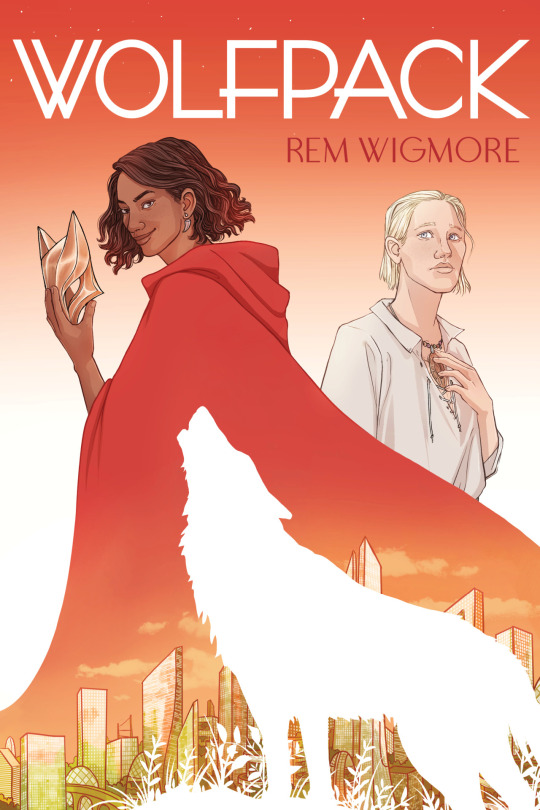
yes
YES
the wolf is out
Wolfpack is a solarpunk novel with teeth, about a bard on a quest causing problems (by accident this time) and then having to fix them; about friendship, love, community, and healing from trauma. Crammed full of queer characters, repartee and far-future tech! It’s the sequel to Foxhunt (which is on sale during release week), so now you can read the whole duology all at once if you want to have double the feelings. I have been reliably informed there are feelings.
(published by Queen of Swords Press, also up at am*zon and kobo and b&n and all that)
110 notes
·
View notes
Text
Social Ecology: A Solarpunk Practice
One of the most appealing ways I’ve found to think about solarpunk ideology is by using social ecology as a practical framework. Social ecology is a philosophy created by Murray Bookchin that holistically understands our ecological crisis. It declares that humans are inseparable from the environment, instead of our prevailing western assumption of being “above” or “removed” from it. Social ecology is a different mode of thinking than our dualistic, hierarchical, mechanical, and authoritarian social system.
The world is a complex place, and one of its most complex relationships is between humans and the natural environment. There needs to be a balance between the two since humans have an unparalleled capacity to influence and edit the environment. Harmony between our social systems and our environments is a necessary part of our liberatory practice. This is not achievable in the current societal mode of operation. Not only is our economic system problematic since it commodifies the environment, but it further exemplifies our domination of each other. After all, if humans can be exploited, then of course it'd be acceptable to exploit “lesser” living and/or natural bodies.
This complexity of the world is simplified as a necessity in hierarchical and authoritarian societies. Since information flow is vertical instead of decentralized and distributed, different levels of the pyramid have different levels of information. Hence, how the top of the pyramid can do things like say that climate change is not real in press releases while knowing the truth all along. By taking a radical approach to understanding our environmental issues and how they stem from our social structures, we can look at our ecology hurdles through a liberatory lens.
So, that’s great. Social ecology says, “Hey, the reason why the environment is dying is due to our domination-centered society.” Now what? What do we do? Well, thankfully social ecology has some programs to actually address the problems!
One layer of this is education. Like I said before, simple systems like authoritarian and hierarchical ones by their very design gate information off. Alternatively, by having an open flow of information that is accessible and trustworthy, people will be able to sow the seeds of discontent with the status quo and understand how it’s flawed. Most importantly, they’ll know that there is an alternative. This might be referred to as a "popular education initiative".
This is enhanced by direct democracy. The word democracy has taken on a different meaning in our current day and age, but direct democracy harkens back to its actual meaning. It just means that the people to who the decisions pertain make the decisions themselves. Those who were governed start to govern themselves. Instead of a representative that you have to cross your fingers and hope acts in your best interest, you and your community make the choices. The one-two punch of education and direct democracy will allow people to regain their agency in their lives and live how they desire.
To complement these values are the ideas of equity and sustainable development. While some of that is built into the program through the more direct ownership people have over their communities and themselves, having specific mentions of these is important. It should go without saying, but to be crystal clear, social ecology is useless if it doesn’t provide space for unity in diversity. People’s identities are so important to who they are and their experiences and only serve to strengthen the project. No matter their race, gender, class, ability, or another factor, everyone has value and would be deserving of love from the community. The confluence of ideas and experiences will lead to the most sustainable and ecologically sound development possible. Ideas and insights can be gained by the solidaric relationships formed between individuals and sister communities, locally and “internationally”. Listening to people who have known how to live with the environment harmoniously while upholding and even improving the quality of life is something that social ecology could provide.
Social ecology is an important vector in our social movements; the connected nature of all of our struggles means we have to create programs that address them all. By understanding that we are part of nature, along with the understanding that liberation has to be available for all, we can create robust socially revolutionary projects that will actually make life better for people. Not only that, but the people themselves will be doing the work themselves. We don’t need heroes. We just need each other.
#solarpunk#ecology#sustainable#ecofriendly#writers of tumblr#creative#politics#social ecology#socioeconomic#sociopolitical#environment#sustainability
111 notes
·
View notes
Text
Untitled Solarpunk Story Excerpt
I pulled something in my back while ironing 2 days ago (yes, really) and I've spent most of my time since trying to sit very very still so it stops spasming.
On the down side, it's kept me from my sewing, baking, and socializing plans. On the plus side, it's been good for storyboarding a short solarpunk story I'd like to get out.
Here's a little piece of it. Mostly a brain dump, very little editing. Also you will never convince me that names aren't going to be absolutely ridiculous in the future. Lean into it.
----
The oxygen mask bumped rhythmically against her left leg as she walked down the narrow passageway. She synced her breathing with her steps, keeping her mind on the brief echo of her footsteps and the bobbing of the light from her headlamp and definitely not on the question of just how much dirt and questionable infrastructure sat above and around her.
2 steps, breathe in. When was the last time a real earthquake had come through?
2 steps, breathe out. When was the last time someone had checked the walls down here?
2 steps, breathe in. How long ago did those cracks show up?
2 steps, breathe out. How long would the air down here last if the air pumps stopped? How long would she last until her tank ran out?
Olive’s nails bit into her palms, bringing her mind back to the job, and she quickened her pace.
The next section of lights blinked on as she passed the motion sensor. A cold wave of anxiety churned in her stomach at the idea of the now-empty sections behind her going dark, a seemingly endless tunnel of blackness. Even after a decade of working in the pipes, Olive had to force herself not to give in to the ancient instinct whispering urgently for her to run from the dark and whatever watched and waited in it.
Her eyes scanned for the latest section number. She’d gone deep enough that she should be getting close to the offshoot. 220Z, 221A, there – 221B. Digging her pad out of her tool bag with one hand, she wiped years of grime off the code beneath the number with her other.
The screen flashed to life and the EcoSphere logo appeared, its 10 colored rings pulsing around the Earth, one for each of the services the utility company oversaw globally. Her foot tapped impatiently as the logo dissolved only to be replaced by the AquaTech sector’s logo. Her finger was already hovering over the screen as the authentication prompt appeared. She pressed firmly against the screen protector that was already peeling in the corners and WELCOME OLIVE MCGARDEN greeted her.
“Come on, this century already,” she muttered as the pad struggled to find its connection to the wireless this far from the hub.
Finally in the system, she quickly scrolled to her active work order and scanned the code beneath the section number. She made sure the check-in had registered before stowing the pad back in the bag and pushing the old offshoot door open with a resisting creak that echoed down the hall.
She recalled Apple’s teasing when they had received their work orders that morning. Apple was overseeing the installation of the main pipes for the new office wing on the north side of town – “I’ll bring you back a bar from the fancy new replicator they just installed” – with its brightly lit corridors and smooth automatic doors.
Olive, on the other hand, had been assigned to one of the oldest pipe sections on the flow. Not that she minded. She’d take grimy doors and stale air over running into whatever found a way to survive just under the subscape any day. Nothing survived this deep in the sections.
Stepping into the offshoot, Olive widened the scope and increased the brightness of her headlamp. The AquaTech system could determine there was an issue in the section, now it was up to her to figure out where it was coming from, what was causing it, and get it fixed. The newer pipe areas could self-service most leak alerts, but the maze of aging pipes and narrower tunnels this far down hadn’t been worth the trouble – and cost – to upgrade and so required manual inspection and maintenance whenever a leak alert was picked up.
She spent the next hour walking through the tunnels, looking for puddles and other telltale signs of a leak significant enough to trigger the alert. As the tunnel began branching, she pulled colored flags out of a pocket in her bag and began to mark the forks. Blue for main pipe. Green for first offshoot. Yellow for third. They helped keep the paths organized for future maintenance needs while also making sure she could find her way out when she was done. The fact that there were none down here already here told her she was the first to come down this offshoot in a good, long time.
Expecting the leak to be deeper in the flow grid, she walked past the first dozen branches and picked one at random to begin flagging.
Olive had just pulled out a purple flag to mark the newly found fourth offshoot in her branch when her foot stepped on something soft. Flinching back, she shone her light down where she’d stepped, expecting to see some long-dead remains. Instead, she found a small green patch of moss.
She strained her hearing, listening around the sound of her pulse knocking in her ears. There it was. A thin but steady dripping noise echoed dimly down the branch towards her.
“Found you.”
She quickened her pace, stopping only to hang a fresh flag as new branches popped up to show her path forward. As she hung the last of her purple flags, she made a mental note to pick up more when she checked back in at HQ later and forged ahead regardless, determined to find the source of the leak after coming so far.
Olive pulled up short as she came to a fifth branch, her head whipping around to stare down the narrow tunnel. Her headlamp showed nothing and yet she could have sworn… Taking a deep breath, she turned the light off.
But where she expected suffocating darkness, a dim glow greeted her at the end of the branch and the trickle of water sounded like laughter calling her name.
#creative writing#writeblr#writing#ecopunk#solarpunk#hopepunk#short story#capitalism ruins everything#but there is still hope#story excerpt#olive mcgarden
7 notes
·
View notes
Text
Submission Window: November 1st - December 31st, 2023
Payment: 8 cents per word
Theme: Resource Scarcity
We are seeking stories for an anthology to be titled We Are All Thieves of Somebody's Future which will collect stories with the theme: Resource Scarcity - using up the last of a critical resource and dealing with the aftermath. While stories could be dystopic (ex. the last tree), authors could also explore hopepunk (losing a resource leads to something unforeseen and positive), solarpunk (a pollution laden resource leads to a better solution), fantasy (the last dragon). We are open to all genres. All stories are requested to be between 1000 and 3000 words in length.
Authors may explore any genre with their stories and we encourage a wide variety of ideas and interpretations.
Submission Dates
Submissions open: November 1st, 2023
Submissions close: December 31st, 2023
Reading/Review begins: January 1, 2024
Reading/Review ends: February 29, 2024
All authors will be contacted by: April 15, 2024
General Submission Information
We like to seek out new authors and book ideas ourselves rather than be contacted directly because we are a small, self-funded press, and only publish 4-5 books a year. We usually offer open call submissions on anthologies we decide to do, or we contact authors directly if we have particular needs.
We pay $0.08/word for the stories we publish. Most of our books are limited editions of between 100 and 200 copies and we prefer to print physical books over creating ebooks.
The Air and Nothingness Press is interested only in publishing works created by the individual, creative efforts of human authors.
We are not completely opposed to the use of AI as a tool to develop art or writing, rather we are opposed to the use of it in place of art or writing. If you "wrote" a story by supplying an AI with a prompt, we are not interested.
Stories by authors who have employed any AI text-generation software, apps, services, or any other computer-assisted service or program in the writing of their submissions, including plot generators, human-machine "collaboration," titling, outlining, or any other form of computer driven influence on their creative process other than spelling and grammar checking will not be considered.
Via: Air and Nothingness Press.
9 notes
·
View notes
Text
This day in history

Next Tuesday (December 5), I'm at Flyleaf Books in Chapel Hill, NC, with my new solarpunk novel The Lost Cause, which 350.org's Bill McKibben called "The first great YIMBY novel: perceptive, scientifically sound, and extraordinarily hopeful."b

#20yrsago What happens when you give gamers intellectual property rights? https://web.archive.org/web/20031205163841/https://research.yale.edu/lawmeme/modules.php?name=News&file=article&sid=1290
#15yrsago Little Nemo in Slumberland, Many More Splendid Sundays — a new gigantic collection of Winsor McCay’s lush and surreal comics https://memex.craphound.com/2008/12/03/little-nemo-in-slumberland-many-more-splendid-sundays-a-new-gigantic-collection-of-winsor-mccays-lush-and-surreal-comics/
#15yrsago What is non-commercial use? Creative Commons survey https://web.archive.org/web/20081210100702/https://creativecommons.org/weblog/entry/11045
#15yrsago Women in science group want a female Doctor Who https://web.archive.org/web/20081204091523/https://www.telegraph.co.uk/news/newstopics/celebritynews/3538551/Doctor-Who-should-be-a-woman-say-female-scientists.html
#15yrsago US military interrogator decries torture — worse than useless https://www.democracynow.org/2008/12/3/us_interrogator_in_iraq_says_torture
#10yrsago UN counter-terrorism rapporteur announces investigation into NSA and GCHQ surveillance https://www.theguardian.com/commentisfree/2013/dec/02/guardian-terrorism-snowden-alan-rusbridger-free-press
#10yrsago Podcasting Lawful Interception, a Little Brother story https://ia800903.us.archive.org/6/items/Cory_Doctorow_Podcast_257/Cory_Doctorow_Podcast_257_Lawful_interception_01.mp3
#10yrsago Terabyte laptop SSDs for $435! https://memex.craphound.com/2013/12/03/terabyte-laptop-ssds-for-435/
#5yrsago Med students are being paid to act as Instagram “influencers” on behalf of cosmetics and other products https://slate.com/technology/2018/11/medical-students-instagram-influencers-ethics-debate.html
#5yrsago Spiegel claims ties between Germany’s neofascist movement and secretive billionaire https://www.spiegel.de/international/germany/billionaire-backing-may-have-helped-launch-afd-a-1241029.html
#5yrsago A seemingly ingenious, simple solution to nonrepresentative government and gerrymandering https://www.forbes.com/sites/stevensalzberg/2018/11/12/the-problem-with-our-democracy-isnt-gerrymandering-its-integers/?sh=5bd7e9f2899c
#5yrsago We don’t know how much Village Roadshow paid to buy Australia’s new censoring copyright law https://www.theguardian.com/australia-news/2018/dec/02/village-roadshow-donates-millions-to-major-parties-while-lobbying-on-piracy
#5yrsago The best Christmas computer and electronics ads of 1980 https://paleotronic.com/2018/12/02/paleotronics-12-years-of-christmas-year-one-1980/
#5yrsago An appreciation of the long-lost MP3 player skins of yesteryear https://twitter.com/fart/status/1069312730249650176
#1yrago The urinary tract infection business-model https://pluralistic.net/2022/12/03/painful-burning-dribble/#law-of-intended-consequences


It's EFF's Power Up Your Donation Week: this week, donations to the Electronic Frontier Foundation are matched 1:1, meaning your money goes twice as far. I've worked with EFF for 22 years now and I have always been - and remain - a major donor, because I've seen firsthand how effective, responsible and brilliant this organization is. Please join me in helping EFF continue its work!
8 notes
·
View notes
Text
Looking for Climate Fic Stories
Hi all, the Utopia Climate Fiction Conference was postponed in October and is now being rescheduled as an on-demand event. I'm hoping to organize a panel discussion on climate fic as an immediate response to the precariousness and changeability we're all experiencing and looking for any recommendations for stories (preferably queer) dealing with climate change-- apocalyptic, dystopian, solarpunk, or where the weather might be tangential but impacting the characters in subtler ways.
Would be grateful for any suggestions. Here's a link to the original event if you'd like more background.
6 notes
·
View notes